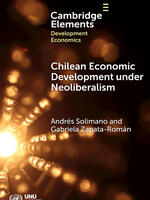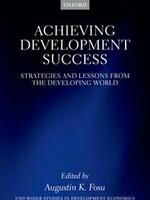Filter by...
Reset all
Publications (69)

In our book, we examine Chile's economic, social, and development policies over the past six decades. The focal point is the enduring influence of the neoliberal model—a model that took root in the mid-1970s under authoritarian conditions and persisted through democratic governments, albeit with...

– Structural Transformation, High Inequality and Environmental Fragility
This publication examines the process of economic development of the last 50 years or so under the neoliberal model in terms of impacts on growth, inflation, income and wealth distribution and structural change. The analysis includes a historical perspective from the nineteenth century to the...
Journal Article
This peer-reviewed research is available free of charge. UNU-WIDER believes that research is a global public good and supports Open Access.
– Evidence from Latin American countries
Part of Journal Special Issue
Women’s Work
Journal Article
This peer-reviewed research is available free of charge. UNU-WIDER believes that research is a global public good and supports Open Access.
– On the role of legibility in tax state development
Part of Journal Special Issue
Fiscal state capacity
Book Chapter
This peer-reviewed research is available free of charge. UNU-WIDER believes that research is a global public good and supports Open Access.
From the book:
Tasks, Skills, and Institutions
Book Chapter
This peer-reviewed research is available free of charge. UNU-WIDER believes that research is a global public good and supports Open Access.
– The case of Chile
From the book:
The Developer’s Dilemma
Working Paper
pdf
– Evidence from multiple policy shifts in Chile
We leverage staggered implementation of lockdown across Chile’s 346 municipalities, identifying dynamic impacts on domestic violence. Using administrative data, we find lockdown imposition increases indicators of distress related to domestic violence, while decreasing domestic violence reports to...
Working Paper
pdf
– On the role of legibility in tax state development
This paper combines cross-national statistical analysis and in-depth historical case studies of Argentina and Chile to explore the relationship between two crucial dimensions of state capacity.We show that information capacity contributes to the development of fiscal capacity. States require...
Working Paper
pdf
Using decomposition methods, we analyse the role of the changing nature of work in explaining changes in employment, wage inequality, and job polarization in Chile from 1992 to 2017. Changes in occupational structure confirm a displacement of workers from low-skill occupations towards jobs demanding...
Working Paper
pdf
– Evidence from Latin American countries
We study the causal effect of motherhood on labour market outcomes in Latin America by adopting an event study approach around the birth of the first child based on panel data from national household surveys for Chile, Mexico, Peru, and Uruguay.Our main contributions are: (i) providing new and...
Working Paper
pdf
In societies where surnames are inherited from parents, we can use these names to estimate rates of intergenerational mobility. This paper explains how to make such estimates, and illustrates their use in pre-industrial England and modern Chile and India. These surname estimates have the advantage...
Journal Article
This peer-reviewed research is available free of charge. UNU-WIDER believes that research is a global public good and supports Open Access.
Part of Journal Special Issue
Welfare and distributive effects of social assistance in the Global South
Working Paper
pdf
– The case of Chile
This paper describes the structural transformations that Chile has experienced in the last 50 years and how they have contributed—or not—to inclusive growth and genuine economic modernization from a historical perspective. The empirical analysis of the paper shows a premature deindustrialization...
Working Paper
pdf
This paper examines Chile Solidario, a social protection programme that provides poor households in Chile with preferential access to a conditional cash transfer programme designed to facilitate investments in children’s health and education. We assess the programme’s longer-term impact on...
Book Chapter
This peer-reviewed research is available free of charge. UNU-WIDER believes that research is a global public good and supports Open Access.
From the book:
Growth, Employment, and Poverty in Latin America

This is an open access title available under the terms of a CC BY-NC-SA 3.0 IGO licence. It is free to read at Oxford Scholarship Online and offered as a free PDF download from OUP and selected open access locations. This book examines the links between economic growth, changing employment...
Working Paper
pdf
– Scope and limits
Historically, Chile has been an economy dominated by mineral and agro-industrial products and subject to frequent external shocks particularly in copper prices. Since the 1980s, the authorities have developed various mechanisms to cope with these shocks and dampen their effects on the domestic...
Working Paper
pdf
– Effects on poverty and redistribution
In this paper, we present comparative evidence for eight Latin American countries regarding design and effects of cash transfers (CTs). On the basis of household survey data, we analyse their coverage, importance in household income, and effects on poverty reduction and income redistribution.We also...
Working Paper
pdf
– How elites influence tax legislation in Latin America
This paper proposes to understand a singular but salient factor that enables the wealthy to deflect their tax burden downwards: elites’ political leverage to shape legislation via their capacity to influence political actors and policy outcomes. The analysis sheds light on alternative mechanisms...
Working Paper
pdf
– Chile country study
During the 2000s Chile achieved rapid economic growth and improved most labour market indicators: the unemployment rate fell; the mix of employment by occupational position and sector improved; the educational level of the employed population, the percentage of registered workers, and labour...

– Lessons from Brazil, Chile, Costa Rica, and the Dominican Republic
From the book:
Achieving Development Success
Blog
– Mobility and Vulnerability in Latin America and the Caribbean
Luis-Felipe Lopez-Calva [1] The concept of social class and specifically middle class, has been widely discussed in sociology and other social sciences, but mostly ignored in modern economics. In practice, the middle class has been defined in terms of income, consumption patterns, occupational...
Blog
Tony Addison This month saw the visit of Kaushik Basu, the World Bank’s new Chief Economist and Senior Vice President for Development Economics, to talk about the global crisis and the impact on emerging economies at a UNU-WIDER seminar. You can see a video interview with Kaushik here. Kaushik is an...
Working Paper
pdf
Using panel datasets from Mexico and Chile for the 2000s, we examine the determinants of middle-class intra-generational mobility. We define the middle class by means of a latent index of economic wellbeing that is less sensitive to short-term fluctuation and measurement error than standard measures...
Blog
Andrés Solimano Chile underwent a free market revolution initiated by the Pinochet regime in the 1970s and 1980s. A very similar model, with some amendments, was followed after the restoration of democracy in the 1990s and 2000s by the social democratic governments. This economic revolution released...
Blog
Tony Addison Finland traditionally celebrates the start of summer on 1st May (the ‘Vappu’ holiday), and UNU-WIDER currently basks in warm sunshine. At this point in the year the daylight lasts for 18 hours, with everyone taking advantage of the long, light evenings. In winter, the shortest days see...
Book Chapter
From the book:
The Role of Elites in Economic Development
Book Chapter
– Improving Diagnosis and the Need to Shift the Understanding of Urban Inequality from Fixed Enclaves to Mobile Gradients
From the book:
Latin American Urban Development into the 21st Century
Book Chapter
– Assessing the Consequences of Allocation and Regulation Policy in Santiago de Chile’s Ferias Libres
From the book:
Latin American Urban Development into the 21st Century
Blog
Tony Addison January saw the snow arrive in Helsinki. As I look out across the harbour, the scene is one of various shades of white and grey. The temperature is well below zero (minus 20oc). But we are now gaining light, having past the shortest day of the year in December. Our mood also brightened...
Working Paper
pdf
– The Chilean Experience, 1973-2010
Since the 1970s, Chile has exhibited a highly skewed income distribution accompanied with strong fluctuations over time. Although income distribution worsened notably in the 1970s-80s, a significant improvement was recorded in the first half of the 1990s, resulting from better economic and social...
Blog
Annett Victorero Latin America has for a long time been synonymous with high inequality, economic instability and authoritarian politics. However, over the last ten years, the region has started to show considerable improvement in all of these areas. Growth has been sustained, the region has...
Working Paper
pdf
– Improving Diagnosis or the Need to Shift the Understanding Urban Inequality from Fixed Enclaves to Mobile Gradients
Current urban interventions, particularly in cities in developing countries like Santiago de Chile, evidence major neglect in understanding the way contemporary living takes place and how it is changing under processes of globalization, global warming, technological advances, as well as specific...
Working Paper
pdf
– The Case of Ferias Libres in Santiago de Chile
Unlike in most Latin American cities, street vendors organized in farmers’ markets popularly known as ferias libres in Santiago de Chile, gained legal recognition early in the twentieth century. Since then, comunas, or local municipalities, have provided vendors with individual licenses that...
Working Paper
pdf
An elite derives its status from its relationship to property, whether physical or human capital. While stable property rights are necessary for everyday business, unstable property rights that result in major institutional changes (such as land reform) may have a positive impact on economic...
Blog
– Examples from Ethiopia and Chile
Mulu Gebreeyesus and Michiko Iizuka Industrial policy can be defined as the policies that stimulate specific economic activities and promote structural changes. It is not about industry per se but also includes non-traditional agriculture or service (Rodrik 2007). Pack and Saggi (2006) similarly...
Working Paper
pdf
– Lessons from Brazil, Chile, Costa Rica and the Dominican Republic
This paper provides a synthesis of the four papers on the Latin American and Caribbean economies: Brazil, Chile, Costa Rica, and the Dominican Republic. It focuses on the following themes: macroeconomic stabilization and fiscal challenges, poverty and inequality, and the use of natural resources to...
Blog
Marco V. Sánchez and Rob Vos Substantial slowdown in progress towards the Millennium Development Goals (MDGs) should be expected as a consequence of the global economic downturn. Even prior to the crisis and despite significant progress, many countries have not been on track to meet most MDGs (see...
Working Paper
pdf
– Achievements, Failures and Dilemmas
The Chilean development story of the last two to three decades is a mix of successes in the macro, growth, poverty and trade fronts but also of failure in reducing chronic inequality of income and wealth. In addition, the current growth patterns have serious impacts on the environment, natural...
Working Paper
pdf
– Lessons from a Positive Experience
Chile, in the last 15 years, has shown remarkable results in terms of growth, poverty reduction and democratic governance. This paper reviews the structural changes that were behind these positive outcomes, as well as the pending challenges for Chile’s development. Also shows that Chile did better...
Journal Article
– El Consumo es Sensible al Precio
Part of Journal Special Issue
Symposium on Spatial Inequality in Latin America
Journal Article
– The Experience of Chile, Colombia and Israel
Part of Journal Special Issue
Symposium on Spatial Inequality in Latin America
Book Chapter
– Latin American Exchange Rate Policies During the Asian Crisis
From the book:
From Capital Surges to Drought
Book Chapter
– The Experience of Latin America since the Tequila Crisis
From the book:
From Capital Surges to Drought
Displaying 48 of 69 results
 Join the network
Join the network